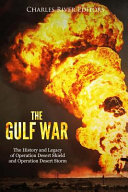Product desciption
The Gulf War The History And Legacy Of Operation Desert Shield And Operation Desert Storm Charles River Editors by Charles River Editors 9781985304925, 1985304929 instant download after payment.
*Includes pictures *Includes online resources and a bibliography for further reading It was one of the 20th century's most decisive wars, but also one of its most influential. In the wake of Saddam Hussein's invasion of Kuwait, America led a coalition of dozens of nations that repelled the Iraqi attack and smashed Iraqi forces, much of which was captured on live television as global networks broadcast the images back home. On the now ironic date of September 11, 1990, President Bush addressed a joint session of Congress to explain why he was assembling a coalition of nations to intervene against Saddam Hussein's invasion of Kuwait. Bush stated, "Out of these troubled times, our fifth objective -- a new world order -- can emerge...A new era, freer from the threat of terror, stronger in the pursuit of justice and more secure in the quest for peace." As his son would later attempt over a decade later in another war against Iraq, President Bush sought to present the coalition of nearly 40 nations as indicative of multilateralism, even though it was dominated by American forces. At the time, the Soviet Union was less than a year away from collapsing, leaving the United States as the sole superpower. In fact, the "new world order" that Bill Clinton and future presidents stepped into was one that allowed for American unilateralism. Since World War II, the United States had protected the West during the Cold War, and President Kennedy had coined the term "Pax Americana" to describe his hope of peace for the world. 30 years later, American presidents now seemingly had the opportunity to use America's unchecked power to instill and preserve peace across the world. As events have proved, the attempt to forge Pax Americana would be much easier said than done, and American involvement in the Middle East has been directly tied to the First Gulf War. As Osama bin Laden and al-Qaeda attacked American targets throughout the 1990s, and most notably on 9/11, the terrorist leader pointed to the stationing of American troops in Saudi Arabia in response to Saddam's invasion of Kuwait. Bin Laden was livid, not just because foreign boots were stampeding on what is popularly considered the holiest land in Islam but also because he had wanted to help defend the Saudi kingdom with his own group. By lashing out, bin Laden was caught up in the Saudi government's crackdown on dissidents and was ultimately forced into exile. Bin Laden took refuge in Sudan in 1992, and later in Afghanistan in 1996. Of course, the Gulf War also played a role in the more controversial invasion of Iraq, which began in 2003 and was again led by the United States. That invasion came about as a result of faulty intelligence and Iraq's skirting of United Nations weapons resolutions, as well as a biting sanctions regime meant to compel Iraq to comply, all of which were put in place after the First Gulf War. The resulting chaos in Iraq, from the bloody fighting to the rise of the Islamic State, can thus all be tied back to the conflict a generation earlier. On top of that, the stateless Kurds in Iraq continue to be important geopolitical players, whether it was their actions during and after the Gulf War, or their involvement in the Syrian Civil War, politics in Turkey, and more. The Gulf War: The History and Legacy of Operation Desert Shield and Operation Desert Storm looks at the fighting and its aftermath. Along with pictures and a bibliography, you will learn about the Gulf War like never before.


